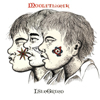 The long-awaited (and almost instantly sold-out) vinyl debut from the less prolific half of Natural Snow Buildings continues Solange Gularte’s fine tradition of dreamlike, disquieting, and temporally dislocated ethno-ambience. While perhaps not as consistently graceful and brilliant as her solo contributions to 2008’s epic The Snowbringer Cult, Modlitewnik is nevertheless scattered with some of her most singular and otherworldly music yet.
The long-awaited (and almost instantly sold-out) vinyl debut from the less prolific half of Natural Snow Buildings continues Solange Gularte’s fine tradition of dreamlike, disquieting, and temporally dislocated ethno-ambience. While perhaps not as consistently graceful and brilliant as her solo contributions to 2008’s epic The Snowbringer Cult, Modlitewnik is nevertheless scattered with some of her most singular and otherworldly music yet.
Modlitewnik ("prayer book" in Polish) opens in supremely haunting fashion, as "Night Dew Call" fades in with sad, vaporous, and almost sacred-sounding wordless vocals amidst a haze of reverb and spectral flutes or pipes. Unexpectedly, however, it lasts less than two minutes before transitioning into the comparatively cheerier, but considerably less impressive "Ver Sacrum," which approximates pastoral Irish folk filtered through a blurred, hallucinatory fog.Fortunately, the bulk of the album is very much in the vein of the initial eerie ambiance, though Gularte breaks up the sequencing a bit with occasional divergences like the relatively straightforward acoustic guitars of "Fire Flies."
Solange’s current aesthetic can be best summarized as "early traditional music warped into something very lysergic and pagan-sounding."What makes her work so fascinating is both the enormous breadth of her inspiration and her unique skill at evoking occult, earthy, and timeless atmospheres.Isengrind’s music simply does not sound like it is being made in the present time, nor does it sound like Gularte has any interest at all in the culture that the modern world is currently producing (aside from perhaps noise/drone music).Instead, this album is a bubbling cauldron of Norse and Babylonian mythology, macabre Romanian lore, inscrutable runes, timeless spirituality, enigmatic art, and folk music culled from India, the British Isles, and the Far East.In fact, the weakest song on the album (the '60s acid-folk-tinged "I Know Where I Am Going") is the only one that overtly nods to relatively contemporary times at all.
There are a few other songs that I don’t particularly care for, but most of the album is extremely good and sometimes stunning. Gularte has a distinct knack for making tambourines, pipes, and sitars sound sinister and ritualistic.She’s also quite adept at some less tangible things, like making sounds echo and bleed together to the perfect degree or allowing songs to unfold at a natural, unhurried pace.Much of the time, Modlitewnik sounds like a very inspired album by a very odd woman with a houseful of exotic instruments and esoteric books.At its best, however, it sounds far more like I just blundered into a forbidden grotto and that a circle of ecstatically-tranced she-druids is now closing in on me, drawing their curved knives for a blood sacrifice.
Samples:
 
Read More

